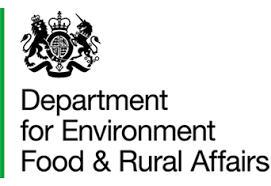
DEFRA logo
Bird Keepers Urged To Maintain Scrupulous Biosecurity Standards As Housing Measures Set To Be Lifted
Mandatory housing measures for poultry and captive birds, which were introduced across England and Wales to help stop the spread of bird flu, will be lifted from 00:01 on Tuesday 18 April 2023, the Chief Veterinary Officer has confirmed today following a latest assessment of the risk level.
Following ongoing monitoring using the latest scientific evidence and a robust risk assessment, bird flu risk levels have been reduced meaning poultry and other captive birds will no longer need to be housed and can be kept outside, unless they are in a Protection Zone. The decision means that from 18 April, eggs laid by hens with access to outside range areas can return to being marketed as ‘Free-Range’ eggs.
The scale of avian influenza outbreaks across the UK and Europe have been unprecedented with over 330 cases confirmed across the country since late October 2021. While the risk of bird flu has been reduced to ‘medium’ for premises with poor biosecurity, the enhanced biosecurity requirements that were brought in as part of the Avian Influenza Prevention Zone (AIPZ) will remain in force as infection may still be circulating in the environment for several more weeks. The risk of bird flu remains assessed as low where good biosecurity is applied.
Those who intend to allow their birds outside are advised to use the upcoming days to prepare their outside areas for the release of their birds. This will include cleansing and disinfection of hard surfaces, fencing off ponds or standing water and reintroduction of wild bird deterrents.
Dr Christine Middlemiss, the UK’s Chief Veterinary Officer, said:
“Whilst the lifting of the mandatory housing measures will be welcome news to bird keepers, scrupulous biosecurity remains the most critical form of defence to help keep your birds safe.
“It is thanks to the hard work of all bird keepers and vets who have played their part in keeping flocks safe this winter that we are in a position to take this action. However, the unprecedented nature of this outbreak has proven it’s more important than ever for bird keepers to remain vigilant for signs of disease and maintain stringent standards of biosecurity.”
Scrupulous biosecurity is the most effective method of disease control available and all bird keepers should apply enhanced measures at all times to prevent the risk of future outbreaks.
Poultry and captive bird keepers must:
- cleanse and disinfect clothing, footwear, equipment and vehicles before and after contact with poultry and captive birds – if practical, use disposable protective clothing
- reduce the movement of people, vehicles or equipment to and from areas where poultry and captive birds are kept, to minimise contamination from manure, slurry and other products, and use effective vermin control
- thoroughly cleanse and disinfect housing on a continuous basis
- keep fresh disinfectant at the right concentration at all farm and bird housing entry and exit points
- minimise direct and indirect contact between poultry and captive birds and wild birds, including making sure all feed and water is not accessible to wild birds
- be vigilant for any signs of disease in their birds and any wild birds, and seek prompt advice from their vet if they have any concerns.
We would encourage all keepers to register their flocks with us. For poultry this is a legal requirement if you have 50 birds or more (poultry includes chickens, ducks, turkeys, geese, pigeon (bred for meat), partridge, quail, guinea fowl and pheasants). Registering with us means that we will be able to contact you with information or action required should an outbreak happen near you. We recently announced a consultation on proposals to require all poultry keepers to officially register their birds (consultation closes at 23:45 on 31 May 2023).
The UKHSA advise that the available evidence suggests viruses currently circulating in birds in the UK do not spread easily to people and food standards bodies advise that avian influenzas pose a very low food safety risk for UK consumers. There is no impact on the consumption of properly cooked poultry products, including eggs.
Bird keepers should report suspicion of disease in England to the Defra Rural Services Helpline on 03000 200 301, in Wales contact 0300 303 8268. In Scotland, contact your local Field Services Office. In Northern Ireland contact DAERA on 0300 200 7840 or your local DAERA Direct Regional Office. Keepers should familiarise themselves with our avian flu advice.
Members of the public are reminded not to touch dead wild birds and are encouraged to report findings of dead wild birds using the new online reporting system or by calling the Defra helpline (03459 33 55 77).
More from DEFRA
- New plans to improve welfare for laying hens and lambs
- Government announces biggest animal welfare reforms in a generation
- Public and animal health benefit from record low sales of veterinary antibiotics
- Housing measures introduced to protect poultry and other captive birds
- Field trials for bovine TB cattle vaccine and companion skin test move to next phase

 3 years ago
3 years ago  949 views
949 views